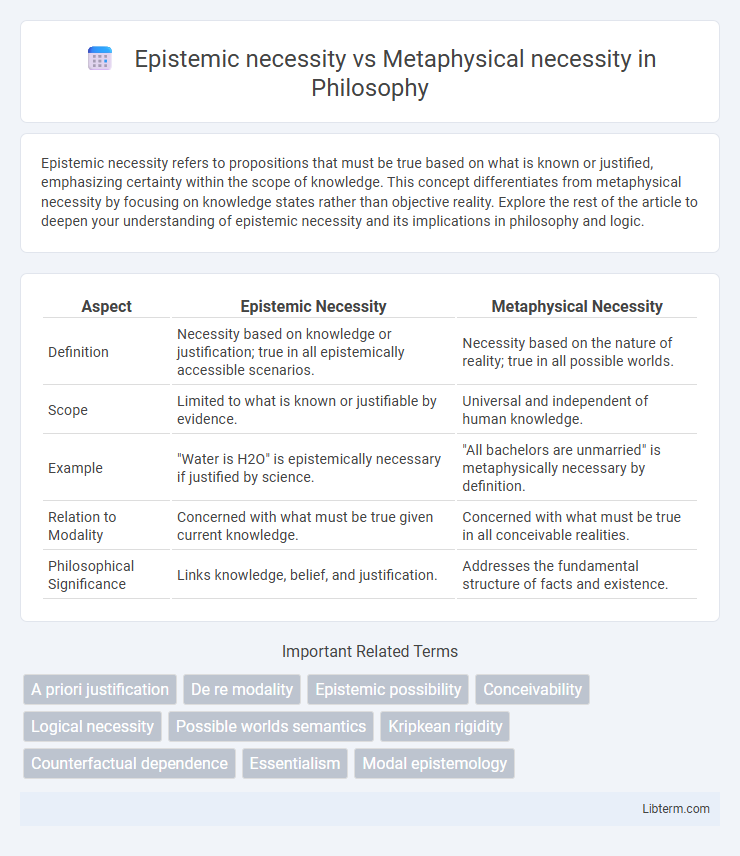Epistemic necessity refers to propositions that must be true based on what is known or justified, emphasizing certainty within the scope of knowledge. This concept differentiates from metaphysical necessity by focusing on knowledge states rather than objective reality. Explore the rest of the article to deepen your understanding of epistemic necessity and its implications in philosophy and logic.
Table of Comparison
| Aspect | Epistemic Necessity | Metaphysical Necessity |
|---|---|---|
| Definition | Necessity based on knowledge or justification; true in all epistemically accessible scenarios. | Necessity based on the nature of reality; true in all possible worlds. |
| Scope | Limited to what is known or justifiable by evidence. | Universal and independent of human knowledge. |
| Example | "Water is H2O" is epistemically necessary if justified by science. | "All bachelors are unmarried" is metaphysically necessary by definition. |
| Relation to Modality | Concerned with what must be true given current knowledge. | Concerned with what must be true in all conceivable realities. |
| Philosophical Significance | Links knowledge, belief, and justification. | Addresses the fundamental structure of facts and existence. |
Introduction to Epistemic and Metaphysical Necessity
Epistemic necessity refers to what must be true given what is known or can be known, often tied to logical certainty and evidence-based belief. Metaphysical necessity involves what must be true in all possible worlds, independent of human knowledge or epistemic limitations, reflecting the essential nature of reality. Understanding the distinction helps clarify debates in philosophy about the limits of knowledge versus the fundamental structure of existence.
Defining Epistemic Necessity
Epistemic necessity refers to propositions that must be true given what is known or justified within an epistemic context, emphasizing knowledge-based constraints. It contrasts with metaphysical necessity, which concerns truths that hold in all possible worlds regardless of our knowledge. Defining epistemic necessity involves understanding it as truth contingent on evidence or justification rather than on the nature of reality itself.
Understanding Metaphysical Necessity
Metaphysical necessity concerns truths that hold in all possible worlds due to the nature of reality, such as "water is H2O," which remains true regardless of our knowledge. Understanding metaphysical necessity involves recognizing that these truths are not contingent on human cognition but on the essential properties of entities. This contrasts with epistemic necessity, which depends on what is known or justified from the perspective of an agent.
Key Differences Between Epistemic and Metaphysical Necessity
Epistemic necessity concerns what must be true given our knowledge or evidence, reflecting certainty relative to human understanding, while metaphysical necessity pertains to what must be true in all possible worlds regardless of human cognition. Epistemic necessity depends on current information and can change with new evidence, whereas metaphysical necessity remains constant across all conceivable scenarios. This distinction highlights that something epistemically necessary might not be metaphysically necessary, as knowledge limitations differ from the inherent nature of reality.
Philosophical Contexts and Historical Background
Epistemic necessity refers to truths that must be known or justified given our knowledge state, emphasizing the limits of human understanding and evidence in philosophy. Metaphysical necessity involves truths that hold in all possible worlds, reflecting essential properties and the fundamental nature of reality. Philosophers like Kripke and modal logicians historically distinguished these concepts to clarify debates on modality and the analysis of necessity within metaphysics and epistemology.
Modal Logic: Mapping Necessity Types
Epistemic necessity in modal logic refers to propositions that must be true based on what is known or justified, representing knowledge constraints within possible worlds. Metaphysical necessity involves propositions true in all possible worlds due to the nature or essence of entities, independent of epistemic limitations. Modal logic uses distinct modalities to differentiate these necessity types, enabling rigorous mapping of epistemic vs metaphysical commitments across possible-world semantics.
Epistemic Necessity in Knowledge and Belief
Epistemic necessity refers to truths that must be known or believed given the available evidence, highlighting the relationship between knowledge and justification. It emphasizes what cannot be reasonably doubted based on one's information, distinguishing it from metaphysical necessity, which concerns what must be true in all possible worlds regardless of knowledge. In epistemology, understanding epistemic necessity clarifies how individuals form justified beliefs and acquire knowledge, anchoring certainty to cognitive constraints and evidence.
Metaphysical Necessity in Reality and Ontology
Metaphysical necessity pertains to propositions or truths that must hold in all possible worlds due to the fundamental nature of reality and existence, reflecting constraints rooted in ontology. It contrasts with epistemic necessity, which depends on what is known or justified, as metaphysical necessity reveals what entities or relations exist independently of human knowledge or belief. In ontology, metaphysical necessity ensures that certain structures, such as causality or identity, are inescapable features of any viable reality.
Debates and Challenges in Distinguishing Necessities
Epistemic necessity concerns truths that are necessary given what is known or justified, whereas metaphysical necessity pertains to truths that hold in all possible worlds regardless of knowledge. Debates arise from the challenge of distinguishing whether a statement's necessity is grounded in our epistemic limitations or in objective metaphysical facts. This distinction impacts modal logic and metaphysics, with ongoing disputes about how to classify statements like mathematical truths or identity claims.
Implications and Applications in Contemporary Philosophy
Epistemic necessity concerns what must be true given our knowledge and justifications, influencing debates on a priori knowledge and rational belief formation in contemporary epistemology. Metaphysical necessity pertains to the nature of reality and what could not have been otherwise, underpinning modal metaphysics and arguments about possible worlds and essential properties. The distinction shapes discussions on the limits of human understanding, the structure of logical systems, and the foundations of metaphysical realism versus anti-realism in current philosophical inquiry.
Epistemic necessity Infographic

 libterm.com
libterm.com